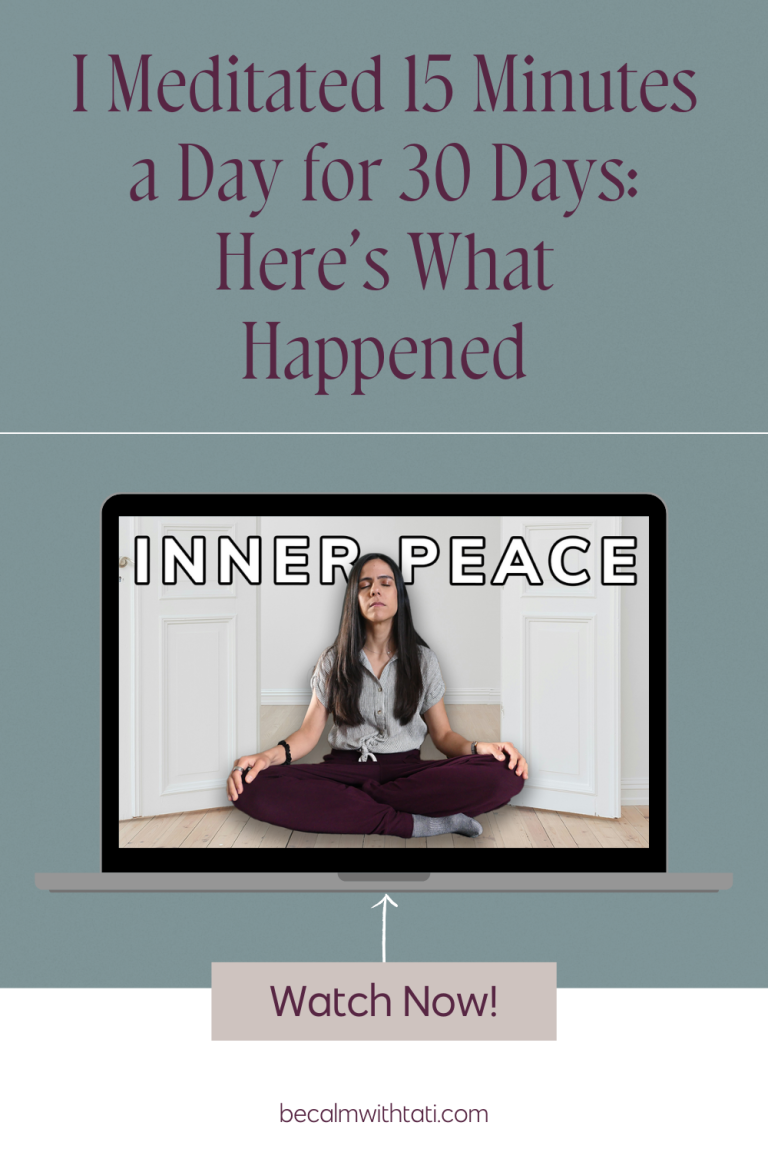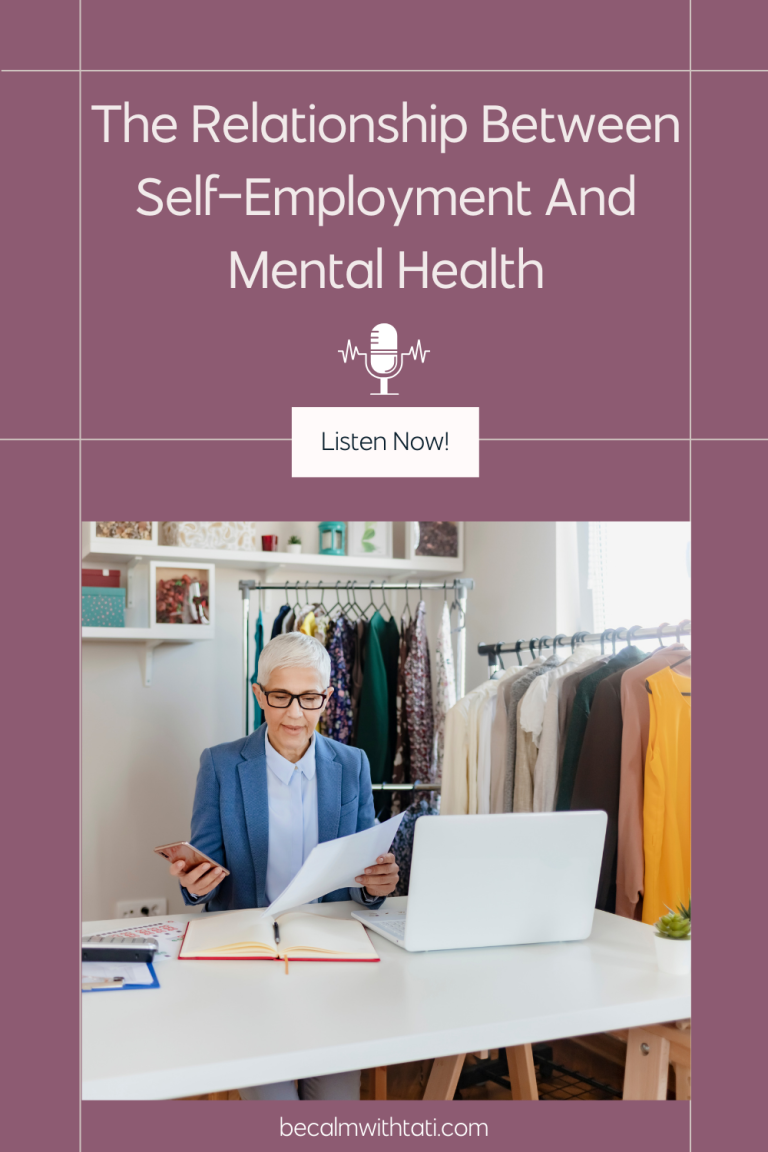Are you the kind of type A, organized person who loves your to-do lists? And yet you sometimes find yourself also resenting your to-do list, feeling overwhelmed and controlled by it and as though you cannot relax until everything is checked off. In this episode, you will learn actionable as well as mindset tips to actually stop your to-do list from controlling your life (and your mind).
In this episode, you will learn:
- What being controlled by your to-do list looks like
- The main reasons why your to-do list controls you
- 4 simple tips to take control over your to-do list
Get Todoist: https://get.todoist.io/8e7o0ay8n081 (referral link)
LISTEN NOW:
🎧 CLICK HERE TO LISTEN TO CALMLY COPING WHEREVER YOU LISTEN TO PODCASTS
WATCH NOW:
FREE TRAINING: How to Create Work-Life Balance and Feel Calmer From Within
If you want to learn how to take back control of your life so you can feel calmer and more confident, and learn the tools to spend your time according to what matters most to you (no matter what your schedule is like right now)…
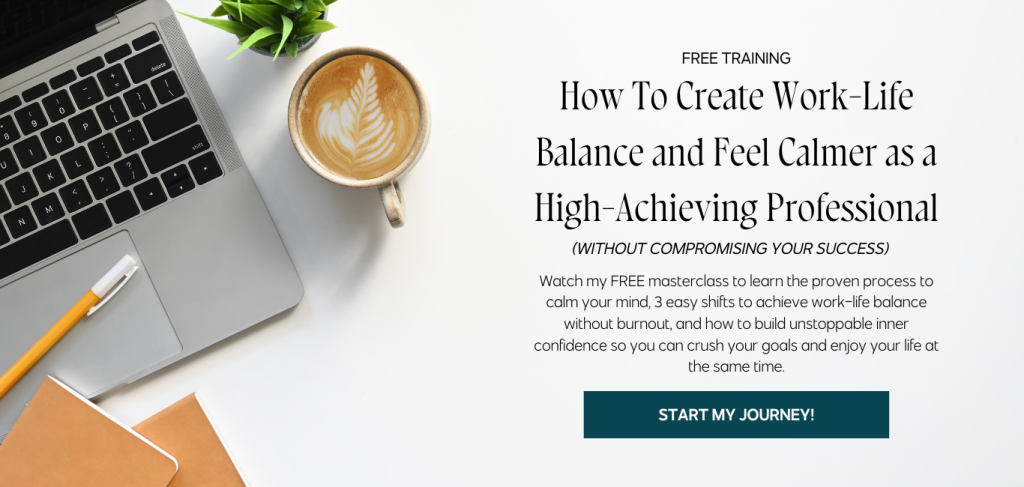
LISTEN, REVIEW, AND SUBSCRIBE TO THE PODCAST!
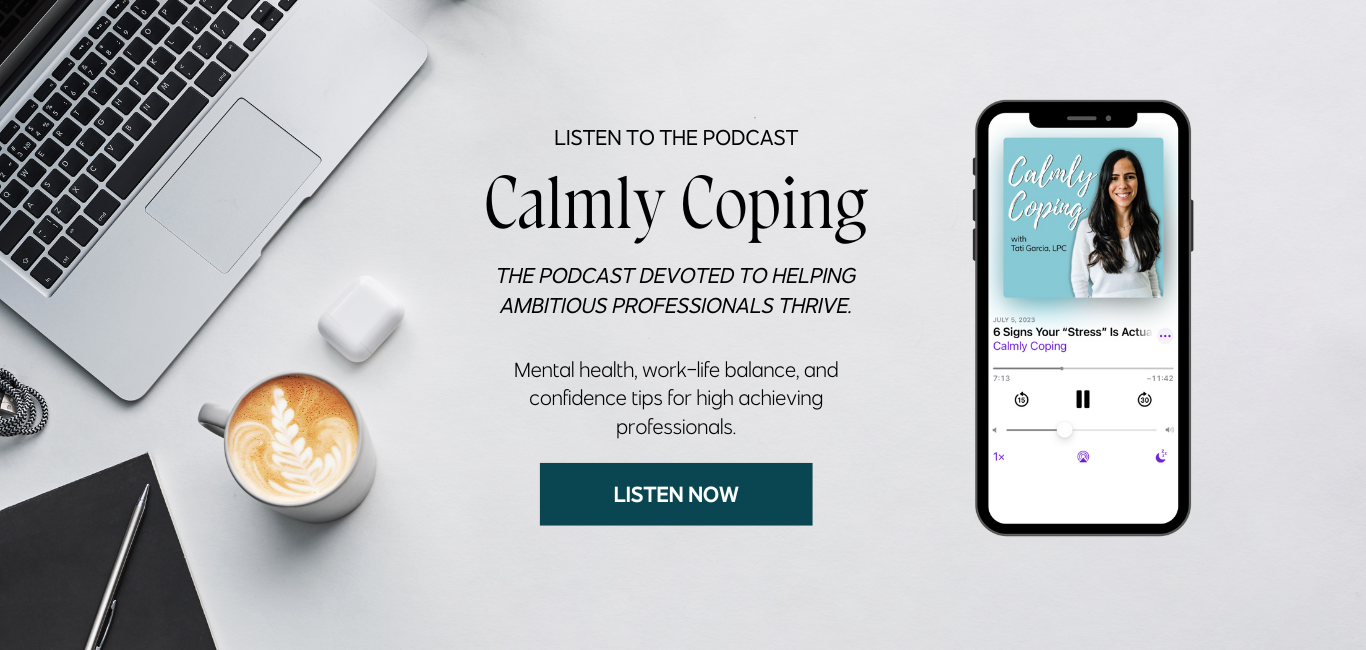
INTRO/OUTRO MUSIC: Rescue Me (Instrumental) by Aussens@iter (c) copyright 2018 Licensed under a Creative Commons Attribution (3.0) license. http://dig.ccmixter.org/files/tobias_weber/57990 Ft: Copperhead
DISCLAIMER: All content here is for informational purposes only. This content does not replace the professional judgment of your own mental health provider. Please consult a licensed mental health professional for all individual questions and issues.
TRANSCRIPT:
Click here to view the episode transcript.
Are you the kind of type A organized person who loves your to-do lists? And yet you sometimes also find yourself resenting your to-do list, feeling overwhelmed and controlled by it as though you can’t relax until everything is checked off? If so, this episode is for you. In this episode, you will learn actionable and mindset tips to actually stop your to-do list from controlling your life and your mind.
Welcome to Calmly Coping. I’m your host. Tati Garcia. I’m a licensed therapist and a high-functioning anxiety coach. Calmly Coping is the podcast for people who struggle with anxiety and high-functioning anxiety. Each Wednesday, you’ll hear informative episodes with actionable tips about decreasing anxiety, adopting a healthy mindset, and managing your time and energy so you can live a calm and balanced life.
Let’s get started.
Thank you so much for tuning in. So in this episode, you will learn what being controlled by your to-do list looks like, why you struggle with being controlled by your to-do list, along with four actionable and mindset tips to help you stop your to-do list from controlling your life. Let’s get into it.
So many of the high-achieving professionals that I work with are super organized and great at making and managing to-do lists. However, they find that when they take time to relax or slow down, their to-do list is still running through their mind. Whether it’s when they’re sitting down to watch TV at night, whether it is when they are on vacation with their family or in the middle of the night at two or three a. m. when they get woken up worrying about all the things that they have to do the next day. And if this sounds like you, then you are definitely not alone. So when you are controlled by your to-do list, it can look like you having tons of responsibilities to do. So of course you write them down in your to-do list because you want to remember to do them.
You don’t want to forget them. And also you want to organize the tasks that you have to do so that you can be sure that you’re getting them done on time. You might feel a sense of relief and control from having this organization and from writing things down. And at the same time, you also feel beholden to that list.
You might feel like a failure if you haven’t gotten everything done on your list. You feel like you can’t relax until you check things off. And you sit down to relax and you keep getting up just to… Check one more thing off, just to get one more thing done. And you also feel a huge sense of accomplishment when you get everything on your list done, as though your mood and how you feel about yourself is dependent upon how many things you do and what you get done.
You might struggle with logging off your computer until you just get this one next thing done. And then you find yourself hours into the evening wondering, where did my night go? These signs could mean that you’re controlled by your to-do list. And it’s time to take back control while still getting things done.
And also respecting your needs as a human. We are human beings, not human doings. Which means that it is okay to be and not have to constantly be checking things off of a list or be constantly productive. And when we get stuck in that cycle, often it can feel as though you’re wasting time if you’re not getting things done, if you’re not being productive.
And this can just lead into this never ending cycle of constantly needing to do things and check things off and accomplish things, while at the same time neglecting your very real needs as a human to just be, to just relax, to not have the weight and the burden of responsibility, pressure, and stress of I need to constantly be getting things done on top of you.
So here are some reasons why you may be in this place of feeling controlled by your to-do list. Of course, there is the very real responsibility that we all have, and this looks different for everybody. Especially if you’re somebody who has a lot of responsibilities on your shoulders. Maybe you are the breadwinner for your family.
Maybe you are feeling stressed financially. Maybe there are other things going in your life that are making you feel as though you have to carry a lot on your plate. Maybe you are a caregiver for a family member or you’re a parent in addition to working full time or maybe you are an entrepreneur or a small business owner and you feel as though all of the burden of the responsibilities and decision making falls on you.
So these are just some examples of the situations where you may feel as though you have a lot of responsibility on your plate. Even if you aren’t in any of these situations, it is very valid to feel as though we have a lot of things that we need to be doing and are expected of us as humans in order to survive and maintain our livelihood.
You may also be somebody who is high-achieving and so as a result you enjoy accomplishing things and getting things done and constantly striving for the next thing. And so because of that you are the kind of person who enjoys reaching for goals and putting things down on your to-do list to accomplish.
There may also be an underlying fear of dropping the ball that you might feel. So you might worry that if you stop doing the things that you need to do, or if you take a break or take a step back, then that means you’re dropping the ball and everything’s going to fall apart. And it can feel very real that there’s this resistance to taking a step back and to not focusing constantly on all of these things that you need to do.
Because if you don’t focus on them and have them in your forefront, then something could go wrong and then it will be your fault and your responsibility or there will just be the natural consequences of something going wrong. It could also be that your productivity is tied to your self-worth. So how productive you are determines how valuable you feel about yourself, how worthy you feel as a human, and you might feel as though if you’re not being productive, that means that you’re lazy, you’re worthless.
You’re wasting time. You’re not good enough. So then you get stuck in this cycle where you feel as though you constantly need to be checking things off and doing things on your list. And then that helps you to feel better about yourself as a person. This can be a sticky place to be in because we are so much more valuable as humans and our self-worth is in so much more than the things that we do.
And it could also be patterns that you have witnessed throughout your life, whether it was in parents or caregivers or other adults in your life that maybe you witnessed them never relaxing and constantly on the go or constantly doing things, whether it was around the house or otherwise, and this is something that as a result, you could have internalized and you could then have that expectation for yourself that this is just the way that things are.
Or it could also be that there were negative things that you heard as a result. Let’s say if you weren’t doing chores growing up, or if you weren’t fulfilling your responsibilities, let’s say in school, then there may have been negative consequences or punishment or anything else that you received as a child.
And this may be something that then you have taken with you these patterns into adulthood, the expectation of, “Okay, I always need to be getting things done and accomplishing and being busy because then when I don’t do that, then bad things will happen” because you have that association that you might have experienced in childhood.
So these are just a sampling of the reasons why you may be in this place of your to-do list controlling your life. So now let’s get into some actionable as well as mindset tips that are simple and that can help you to get out of this place of feeling like you constantly need to check things off and be doing all the things and so that you can get the things done that you need to so that you can lift that burden off of your mind.
So tip number one is to minimize your list. So this looks like putting less on your to-do list. Then you think one rule that I like to follow is limiting yourself to one to three major tasks per day. So this doesn’t mean like the smaller admin things or chores that you may have to do throughout your day, but really those main things that might require more time and energy.
And also doubling the amount of time that you think it will actually take to complete a task. Because as humans, we tend to underestimate how long it will take us to complete things, thus resulting in more overwhelm and stress and pressure in the long run, because we feel as though we’ve packed too much into a shorter amount of time.
So kind of experiment with what number of tasks works for you throughout your day. And this kind of brings me to the tip within this tip of if possible having separate lists for separate days. So whether that looks like writing it out in a planner. For me personally, I really like using the tool Todoist.
We’ll leave a link to that in the description. And Todoist is excellent because you can attach dates to the tasks that you put In, you can also categorize them by project. You can also create recurring tasks, have tasks at specific times, connect it with your calendar and, and all of those things so that you are only seeing the to-do list tasks that you have to do for this specific day.
And then it’s kind of a thing of out of sight, out of mind. It’s not that you’re not going to get to it, but you can trust that, “Okay, my tasks for tomorrow are going to be there waiting for me and I’m just focusing on what I have to get done today.” And that can help with just your focus and those moments.
If you find yourself waking up in the middle of the night, worrying about the things that you forgot to put on your list or the things that you have to do the next day. Another tip that I have is to stop “shoulding” on yourself. Having this expectation and the word “should” in your vocabulary oftentimes just creates more stress, pressure and unrealistic expectations for yourself.
So many times we can think, “Oh, I should be able to get all of these things done today.” And then when you don’t, you’re really hard on yourself and beat yourself up as a result. Now, the reality is that we all have fluctuating energy throughout our days and throughout our lives. And whether it is you are at a different stage in your life where you have more stress in other areas of your life, that’s making it more challenging for you to get things done the way that you used to. Whether you are aging and that’s just a normal part of the process where you’re not going to be able to get as much done as you used to be able to, or whether you’re in a stage where maybe you’re feeling super productive and super energized and you’re able to get more done. And also recognizing that it’s important to follow that up with periods of rest.
So recognizing that you are exactly where you need to be, and you are doing the best that you can in this moment, rather than “shoulding” on yourself and thinking, “I should be able to do more. I should have accomplished more today.” You’re automatically minimizing and forgetting about all of the things that you have accomplished, all of the things that you are doing well.
And when you can have that perspective to focus on, “Okay, even though I didn’t get everything done today, I did accomplish these things,” that can help to build up the way that you feel about yourself so that you’re focusing on what you’re accomplishing. And I like to use this saying that, “What you focus on grows.”
So the more that you focus on what you haven’t done and being hard on yourself, the more that is going to be your perspective and your way of seeing things. And the more you can focus on what you are accomplishing and achieving and how you are doing well and how you are caring for yourself, that way of viewing things is going to grow.
And then it’s going to be easier to basically build that snowball of momentum to build those, not just perspectives, but also those habits. My next tip is to relax. And I know this can be hard for some people who especially are high-achieving and have all those high expectations for themselves and want to get all the things done.
However, taking time to relax, not just physically, but also mentally can be super powerful. And relaxation looks different for everybody. Relaxation can be passive and where you’re not really moving, like you’re just laying on the couch, hanging out. Or it can be active where maybe you’re going for a walk and leaving your phone behind and just focusing on what’s around you. So it’s going to be different for everybody. And also depending on how you’re feeling in the moment, but I want you to intentionally set aside time for relaxation and for letting go of that to-do list without viewing yourself as lazy, viewing this as necessary and important for you to recharge your batteries so that you can then address your to-do list tomorrow or whenever and be able to check off your responsibilities while also caring for yourself.
And my next tip is to practice self-compassion. So self-compassion is the act of being kind to yourself and not beating yourself up for not completing things on your list. Beating yourself up for thinking that you’re wasting time or whatever it might be in your mind is a huge part of what results in feeling controlled by your to-do list.
It’s a huge part of what keeps you stuck in that cycle of feeling like, “I need to keep doing more” because you’re hard on yourself and then you feel like, “I haven’t done enough. Well, I need to do more.” And then you’re, you’re in this incessant cycle that you feel as though it’s difficult to get out of.
Part of what can help you to get out of that cycle, in addition to getting to the root of what’s keeping you there, is the why that I shared earlier, is that practice of self-compassion and recognizing that you’re doing the best you can and your worth is not determined by how much you do. It’s not determined by how many things you check off of a list.
It’s not determined by how productive you are or how long your to-do list is or anything like that. It is not determined by your output. This is messaging that we have received from our society around us, including various systems, including capitalism, the idea that we are only as worthy as what we can produce.
This is not true. You are valuable and worthy exactly as you are, and you do not need to prove that to anybody, including to yourself. So it is totally possible to get out of the place of your to-do list controlling your life, and it’s all about taking small steps one day at a time. If you’re interested in diving deeper into this topic, then I have a free training for you.
It is called How to Create Work Life Balance and Feel Calmer as a High Achieving Professional Without Compromising Your Success. In this training, you will learn the proven process to calm your mind so you can actually relax and stop your to-do list from constantly running through your mind. Three easy shifts to achieve work-life balance without burnout and how to build unstoppable inner confidence so you can achieve your goals and enjoy your life at the same time.
You can find this training for free by going to calmlycoping.com/workshop and the link will be in the description. And let’s continue the conversation about this topic. If you are watching on YouTube or if you are listening on Spotify, leave me a comment and let me know what does your ideal relationship with your to-do list look like.
While you wait for the next episode, I have other episodes about calming your mind, creating work-life balance, and how to feel more confident from within. Thank you so much for tuning in today and until next time, be calm. Thanks so much for listening. If you like what you heard, please share this episode with a friend and please subscribe and leave me a review on iTunes.
Also, remember to check me out online at calmlycoping.com and connect with me on Instagram @tatianaglpc. All content here is for informational purposes only. This content does not replace the professional judgment of your own mental health provider. Please consult a licensed mental health professional for all individual questions and issues.
Till next time, I’m Tati, and this has been Calmly Coping.
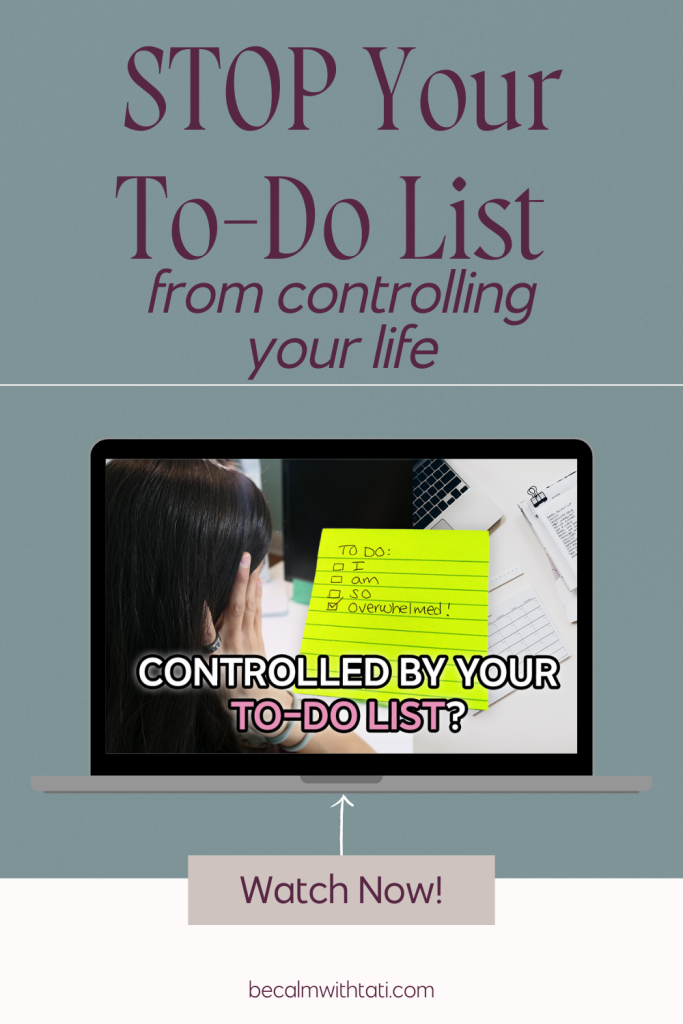
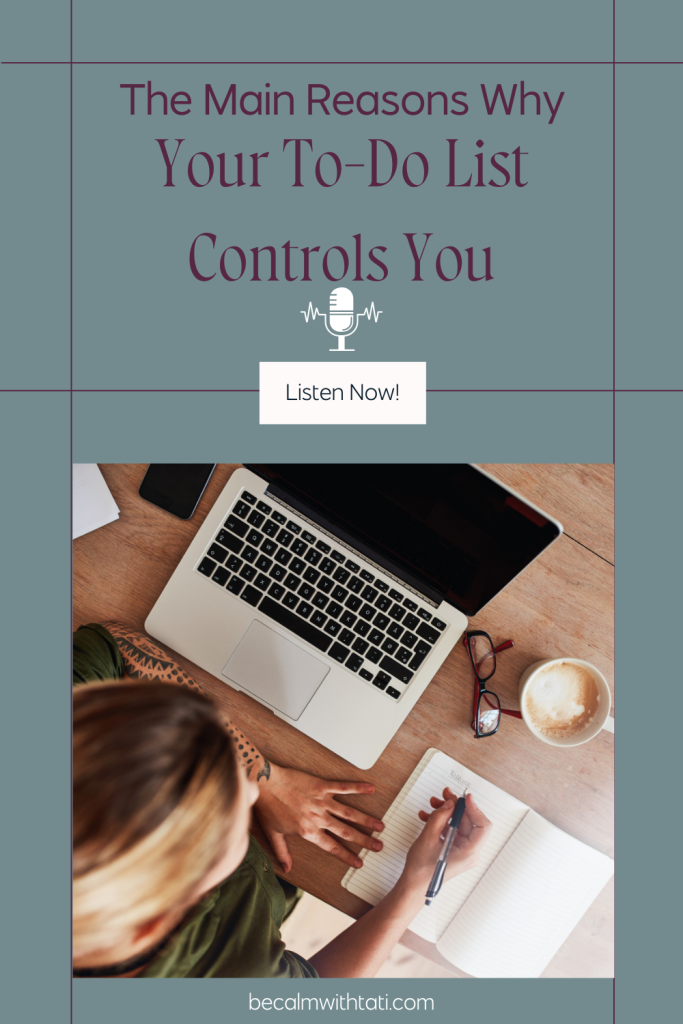
Until next time…




